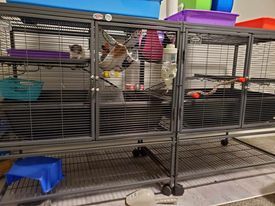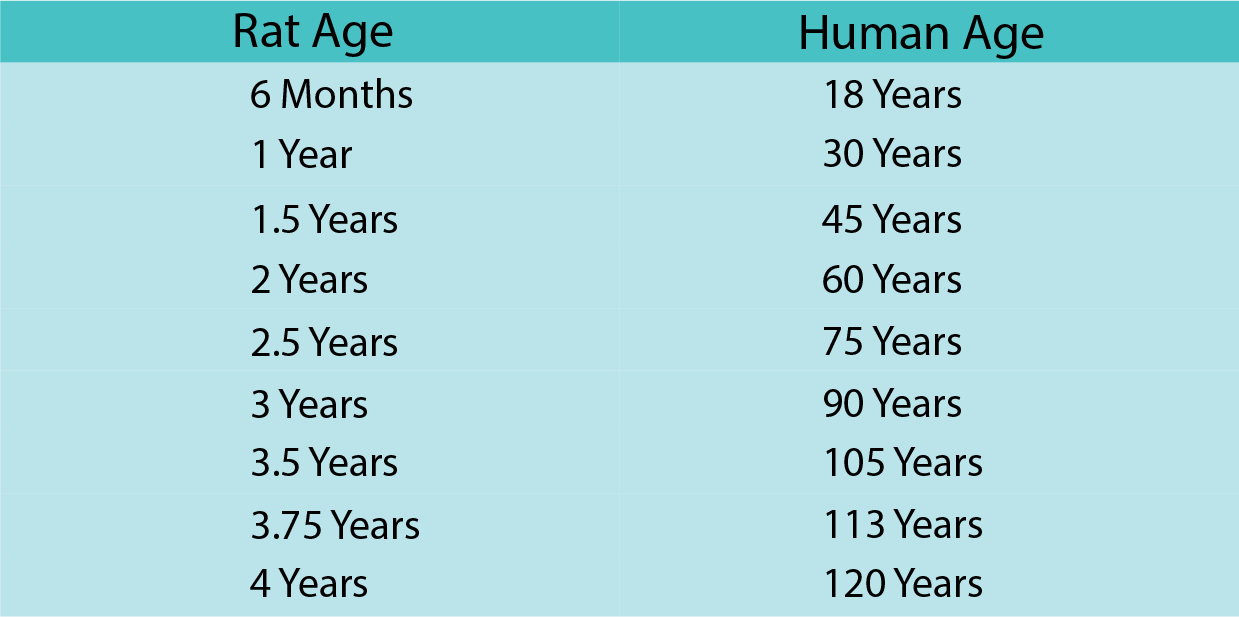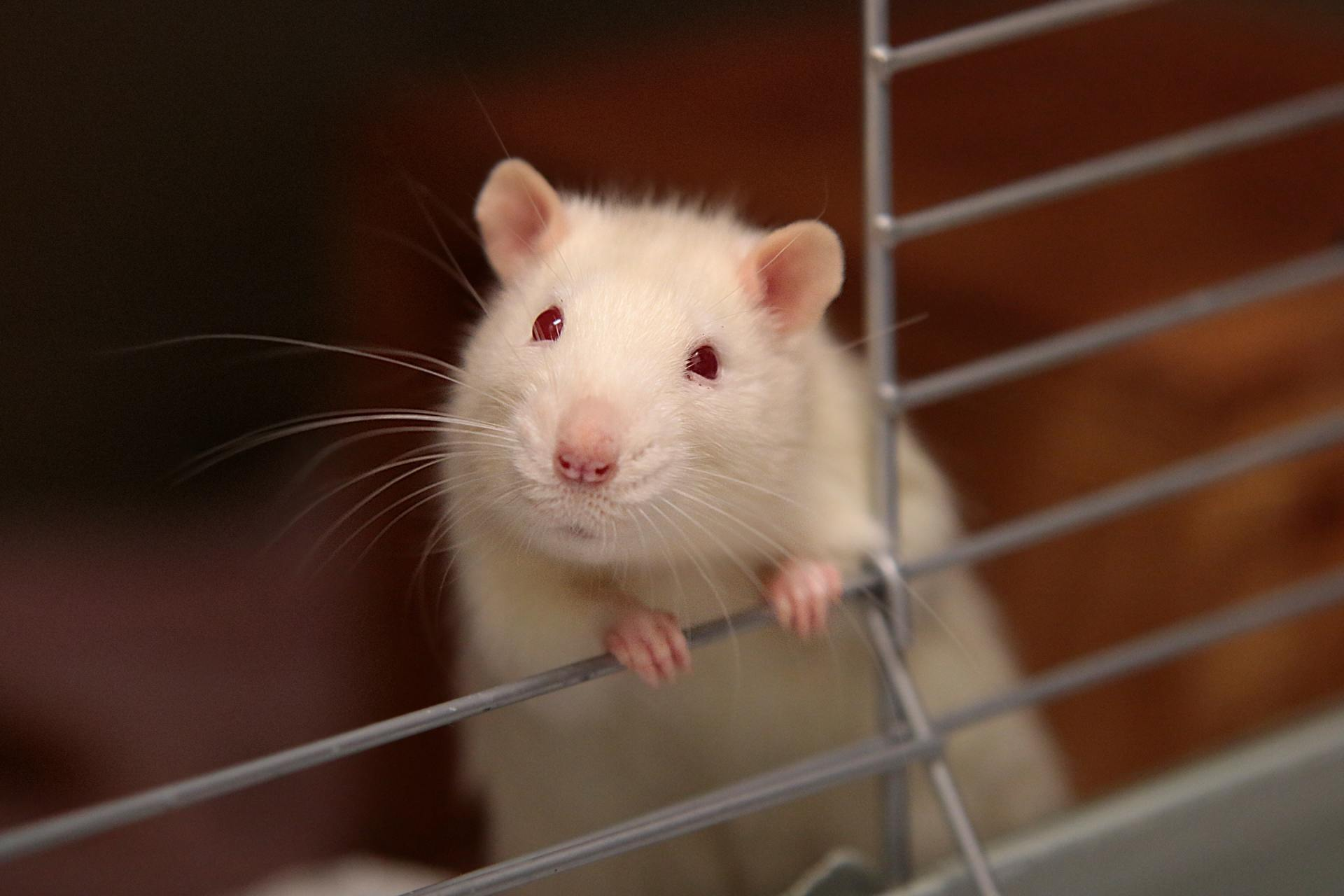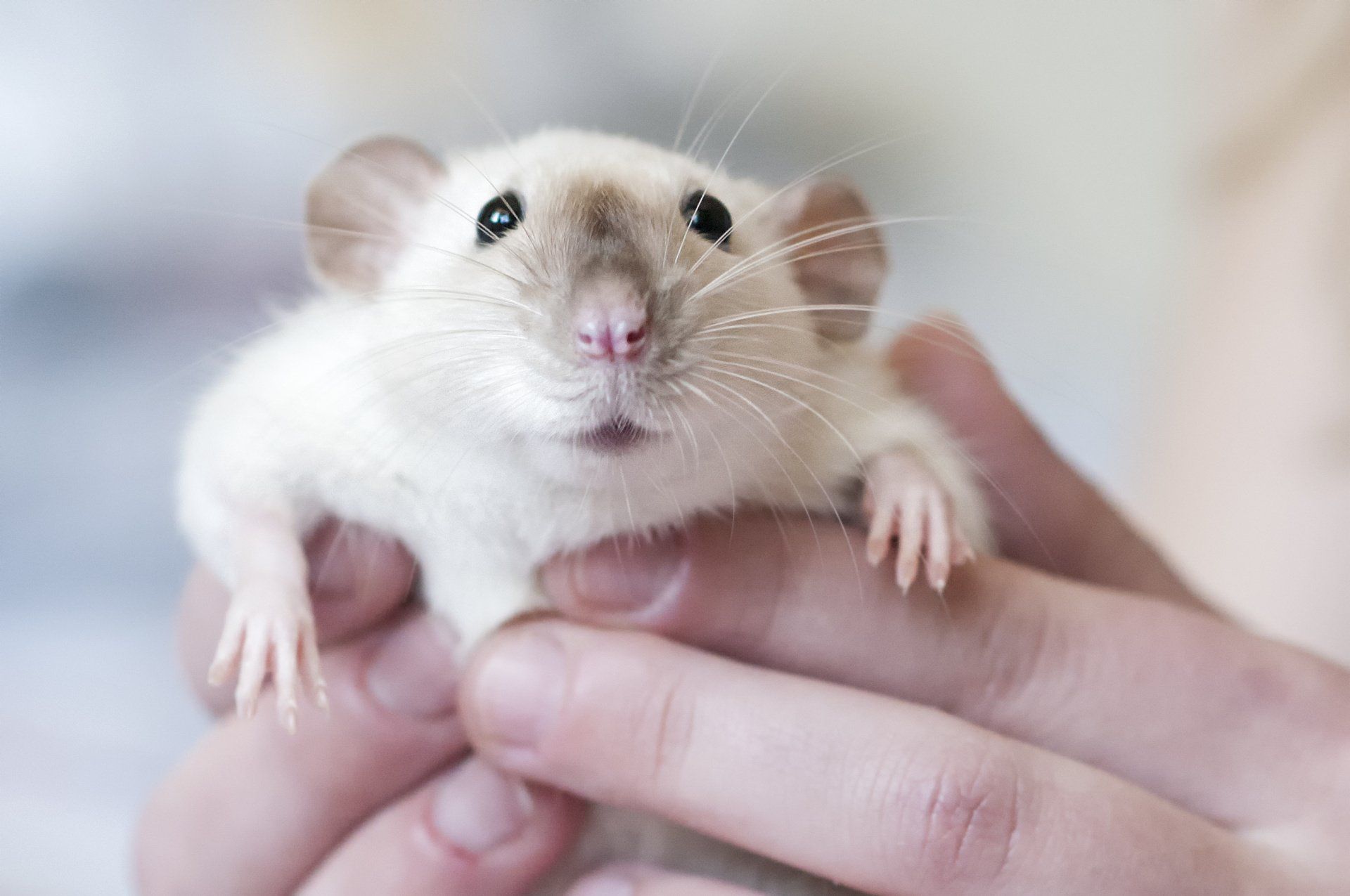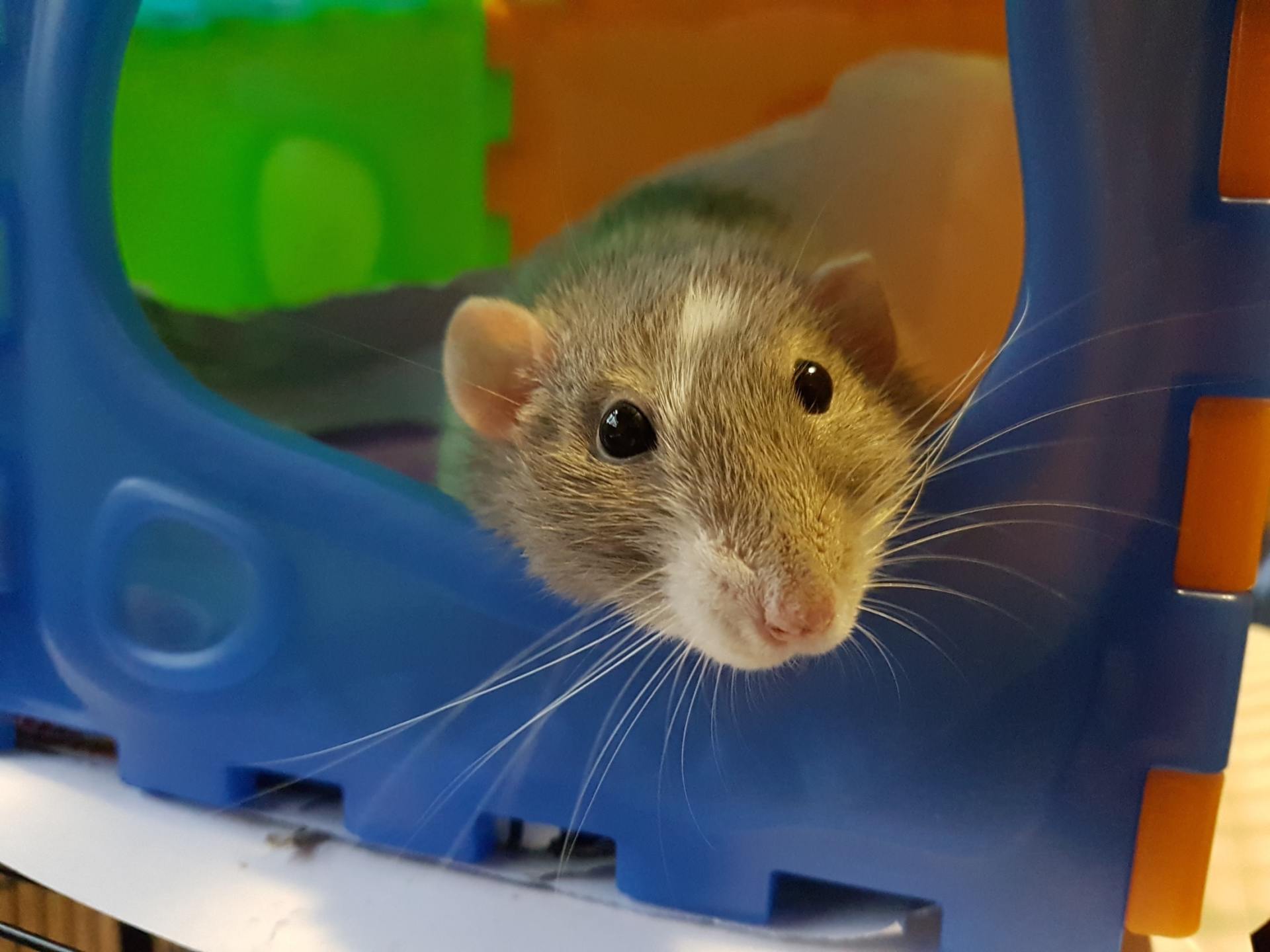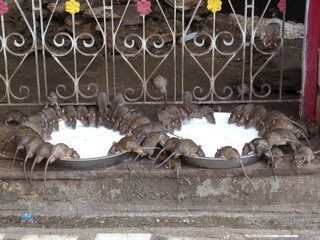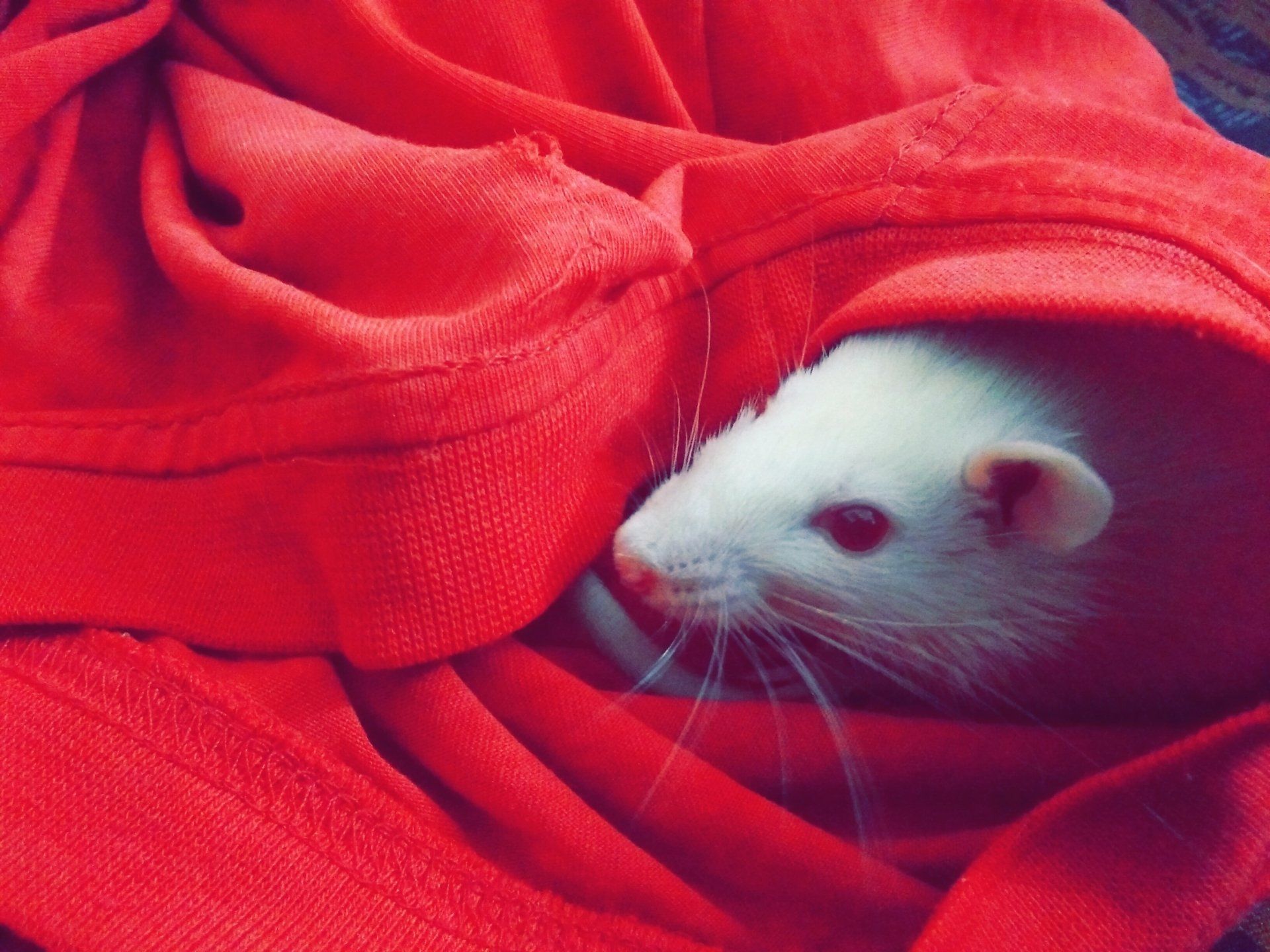The Average Rat Lifespan (And 9 Ways to Extend It)
This post contains affiliate links and I will be compensated if you make a purchase after clicking on my links.
The Average Rat Lifespan (And 9 Ways To Extend It)
We all love our pets, and want the best for them, including as long a comfortable life as possible. If only our loved pet rats could live as long as we do!
The sad reality is the average rat lifespan is 2 years. Some of you may be shocked to read this, having heard of friends' rats who lived to be 4 years or older! While this can happen, it is not super common, and thus owners should be prepared that their loved rat may pass away earlier rather than later, and take measures to extend their rat's lifespan.
Why is the lifespan of the rat so short and what can we do to help them live as long as possible? Pet rats are a lot more delicate than we sometimes think, but through managing their health and proper vet care, we can do our best to give them the best chance at a long rat life!
How Long Is The Average Rat Lifespan?
While the average fancy rat will only live 2 years, they can reach 3 or more years based on genetics and care provided. These few years never seem long enough for an animal that can bond itself so closely to us!
But why do they live such short lives? The reason the lifespan of rats is so short is because they live and reproduce at a much faster pace than us, or most other mammals. Because of this, their bodies wear down at a faster rate, resulting in a relatively short lifespan.
Knowing the reason that rats have such short lifespans, you can debunk the sources that give you a longer life expectancy for rats. For example, Petco has “can live up to 5 years with proper care” on their site for rat lifespan.
This is not only blatantly false on average, but sets future owners up for disappointment. Imagine buying your first rats from the pet store, expecting them to live close to 5 years with adequate love and care, and then passing away at 2.
Wouldn’t you feel like you had done something wrong? When in reality, it may have just been time for the rat to pass on, and you had taken great care of them up until that point.
Pet stores and people spreading this information can negatively affect and even traumatize a first time rat owner. It is important to be prepared as your rat gets older to pay closer attention to their health and signs they are degrading.
Even knowing this, if you have been told the rat isn’t even considered elderly until well past 2, you may miss signs that the rat needs extra medical attention merely because you weren't treating them as a geriatric rat due to misinformation.
Now, this isn’t to say that rats can’t live to 4 or 5, just that it’s very rare. If you have a rat that old, that’s awesome! I wish all of them could live that long (and longer)! If you aren't sure how old your rat is, check out our guide here for some markers to help.
Rat Age Compared To Human Age
Please reference the chart below to see how quickly rats age in comparison to humans.
Reference: The Laboratory Rat: Relating Its Age With Human's
As you can see, making it to four years is quite impressive. I hope this visual helps make sense of the rat lifespan in its relation to human years.
My goal here is to show that an average age isn’t a death sentence at two. Just as the average human will be around 79 years when they pass, it will be between 2 and 3 for the average rat.
My advice on this is be prepared for the worst, but give your rat the best chance it can to live much longer!
Fun Fact: The oldest pet rat ever recorded was Rodney, a lab rat who lived to be 7 years and 4 months (an incredible 130+ years in reference to human years). If only they could all live that long!
Difference In Lifespan Between Wild And Fancy Rats
There is absolutely a difference in the lifespan between your average fancy rat and a wild rat. It makes sense when you consider the circumstances wild rats have to face.
While pet rats are bred for longevity and cared for in a controlled environment, their wild counterparts encounter disease, extermination, predators, and starvation among other hardships and therefore only live an average of 6-11 months.
In contrast, our fancy rats get quite the plush life! They have all the food and water they need, a safe cage and play spaces, and veterinary care when they get sick or injured.
Not only this, but responsible rat breeders breed for health and longevity. Because of these reasons, the pet rat lifespan is (thankfully) 2 or 3 times the length of that of a wild rat.
Does The Type Of Rat Make A Difference In Lifespan?
There are multiple types of pet rats, but their differences in appearance do not affect lifespan. Ear placement, color, and coat type make no difference to how long the rats will live.
An exception to the rule is hairless rats, who, because of predisposition to illness and injury have a shorter lifespan. The average hairless rat lifespan is merely 9-12 months.
This is in no way a reflection on the owner’s inability to care for an animal that has special needs. Hairless rats are actually missing the thymus gland, thus have a much lower immune response, and are harder to keep healthy.
The appearance of the rat may not matter, but the sex of the rat does play a part in average lifespan. Just like most species, the female rat lifespan tends to be longer than that of their male counterparts.
These findings in differences of lifespan between male and female rats are, of course, the average. You may own both males and females and have all your males outlive your females!
Understanding this information is important, as the last thing I want in the rat community is new (or seasoned) owners being discouraged by information out there saying their rats should be living 4-5 years, and their rats only living to 2.
Or likewise, being misinformed and told different types of pet rats have longer lifespans, then being sold an expensive dumbo rat because they "live longer".
Other Factors In Rat Lifespan
There are a few other factors that come into play when determining a rat’s lifespan. For example, breeding and health can have a huge impact on how long your rat will live.
Rats from breeders are likely going to have a better chance at a longer lifespan. Since part of most breeders’ goals are to produce longevity in their pet rats, the rats in their litters are more likely to have better longevity than rats with unknown origins.
This isn’t to say non-breeder rats CAN’T live long. Merely that a backyard breeder or pet store who is not concerned with genetics and health is less likely to produce rats with consistently longer lifespans.
Important Note: If you have an elderly rat, be sure to check often for medical conditions. Keeping them alive solely cause we can’t let them pass is not loving if they are in a lot of pain and nothing more can be done. Sometimes it is time for them to go, and they are doing their best to tell you. Listen to your rat!
Keeping your rats healthy will also help immensely in prolonging their lifespan. Paying attention to their diet, environment, and vet care can help you give your rat a happy (and hopefully long) life!
Extending The Lifespan Of A Rat
We all want our rats to live longer, but are there actually ways to extend the lifespan of a rat? The answer is yes and no. There’s no proven way to extend their lives by multiple years, but through health management and vet care, you can help to give them a better chance at a longer life.
1. Get Your Rat A Friend
This is an extremely important point, which is why it’s first on my list. Rats are prone to depression and illness without having a rat companion.
Even if your rat doesn’t seem depressed by looking at him, you have to take into account the time you aren’t there, and that it can be hard to read their body language.
If you are wanting to give your rat the best chance at a long, happy life, at least one other rat is needed.
2. Where You Get Your Rat
It may not seem like it, but where you get your rat from can have a huge impact on how long they will live.
Rats purchased from reputable breeders are more likely to live a longer, healthier life than a rat bought from a pet store, or rescued from unknown origins.
3. Nutrition
Paying attention to your rats’ nutrition will go a long way in keeping them healthy and happy! The best way to feed them is with a block food, so they cannot pick and choose what they want, but instead receive all the nutrients they need.
Scatter feeding is a great method to use to entertain them and get them to exercise while they eat. By scattering their food around the cage or in a dig bin, the rats will have to forage for it. This can also be done with treats, fruits or veggies.
While treats are fun to give them, they should be given sparingly. Certain treats given too often can make rats gain weight or develop health problems. Be sure what you are giving your rat is okay for them to eat!
4. Adequate Water
This one may seem like a no-brainer, but keep track of how much water your rats are drinking, and if they are staying hydrated!
This is especially important in hotter states, where overheating is a possibility in the summer. Be sure to check your rat for dehydration on the really hot days.
I’ve found a good way to get them to intake extra water in the hot summer months is to add ice cubes or frozen peas to their water bowl!
5. Pay Attention to Weight
Check your rats' weight your regularly, and adjust how much you’re feeding them accordingly. Just as it’s not healthy for a rat to be underweight, being overweight isn’t good either.
You may see a lot of pictures of chunky rats that look so adorable! Sure they look cute, but that extra weight is not helping their health in the long run.
6. Ideal Environment
To thrive, rats need the right environment. This includes the right kind of bedding, a big enough cage, and adequate outlets for their curious minds and boundless energy.
Since rats have such sensitive respiratory systems, they require a dust free bedding, and a relatively clean environment where they aren’t breathing in their own built up ammonia day in and day out.
Speaking of their respiratory systems, tanks or aquariums are no good. The best option is a metal wire cage as this allows air to circulate. With a tank, the air only has one outlet, the top, and the build up of ammonia can make rats sick.
Regular shavings and aquariums are a no go for rats!
The cage should be large enough to accommodate your rats, and when in doubt, go bigger. And don’t be afraid to “clutter” the cage!
Rats love clutter. Having lots of toys (and periodically moving stuff around in the cage), keeps rats' minds engaged with their environment and helps keep boredom and depression away.
Also make sure your rats have time to be outside the cage every day. Whether that be your bed, the bathroom, or a set aside free roam area, getting to be outside the cage an hour or two a day (at least) lets them not only have more space to run around, but further engage their minds as they explore.
Reduce stressors for your pet rats as much as possible. This means doing proper introductions when new rats are added, not changing their location constantly, and not waking them up out of their sleep all the time to play with them.
7. Pay Attention To The Air Quality
You may be thinking, didn’t we already cover air quality? Well, yes and no. While it is important to have the right kind of cage to allow for air flow, I want to go over a few things that can be easy to forget.
While candles, air fresheners, and incense may smell good to us, they aren't good for a rat's respiratory system and should not be used in the same room where the rats are kept.
If you smoke, never smoke near the rats' cage, and keep their living area and anywhere in the house they free roam as smoke free as possible.
A great choice if you can afford it is to get a HEPA air purifier and put it next to the rat cage. This will clean the air of some particles that could be harmful to your rats.
8. Vet Care
One of the most helpful ways to extend your rats' lives is to provide adequate vet care. If something seems wrong, take them to a vet knowledgeable in rats. Sometimes things that lead to fatality could have been avoided by a quick visit to a vet.
Even if it's not an "emergency," consulting a vet can go a long way in helping you understand your rat's physiology and what they need to better their lives.
Find a vet in your area who you can trust and who is familiar with rats BEFORE there is an emergency. That way, you know where to bring your rat and that your rat is going to get the best care possible in the case of an emergency!
Note that it is wise to have money saved up before an emergency happens - refer to our average rat cost article for an idea of how much to have set aside!
9. Spaying/Neutering
A lot of people have differing opinions on this, but spaying has been shown to reduce tumors and extend the lives of female rats. The only consideration is whether you are comfortable having an optional surgery done on such a small animal, and weighing the risks with your local veterinarian.
If you have a male rat, a study has shown that neutering also plays into life expectancy of rats, though is not as effective as health management.
Final Thoughts
While pet rats only live an average of 2 years, this doesn’t mean they don’t have plenty of love to give! The most important thing for your rats' lives is that you are giving them great care, and providing an enriched life. Their life is so very short, make it memorable!
What ages are your rats, and/or what’s the oldest rat you’ve owned? Let me know below!
